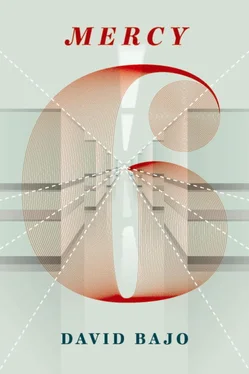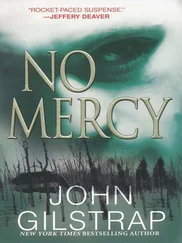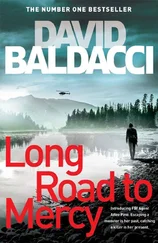Claiborne stood over Verdasco, looking from the young, beautiful body to an overhead display, then back to the body. Mullich was absent, but Mendenhall could see that he had set up shop in one of the lab’s corners. Charts hung over his table, four showing drawings of the bodies in their respective found positions, floating.
Four others appeared as blueprints of the spaces; one displayed the entire hospital cut into floors. The building had three basements, two more below this one. The one just below she had been to once or twice. The third was new to her.
Silva stood at Mullich’s desk, bending slightly to make entries on the architect’s laptop. The drawings of the bodies had lines through them. The drawings of the rooms and hospital had faint spirals on them shot through with blue dashes. A large chart beside the laptop was scrolled out on the desk.
The cold, thin air. The silent motions of Silva and Claiborne.
They could have been on the moon.
Claiborne straightened to face Mendenhall. His mask was down. She started to speak, but he checked her with a look. She snapped on fresh gloves, exaggerating the last pull of elastic.
“I was right,” she said. “Wasn’t I? Trauma through the bronchus in Fleming. In Verdasco,” she nodded toward the body, “through the brain stem and thorax.”
“More or less,” said Claiborne.
She sensed Silva’s approach.
“Trauma,” said Mendenhall. “So, trauma.”
Claiborne shook his head. “Viral. Everything points to viral. Maybe fungal. I never rule that out too soon. But viral is the way to go. Hemorrhagic and sudden. Thorpe’s fear.”
“Thorpe’s hope, you mean.”
Claiborne closed his eyes and took a breath. There was a draw on the violin. “I want you to be right, Dr. Mendenhall. Like I want to be eating Thai with my wife. But he is right. You know it, too.”
She thought, searched past the fatigue. She looked at Silva’s face, relieved to find the tech’s mask down, furtive lips and nose, eyes lifted. “No. I don’t know it.”
“Look, Doctor.” Claiborne opened his hands, his arms. “You are very good at what you do. You made the call right away. You saw it.”
She looked at the clean bodies, their skin reflecting the aimed light. “There should’ve been more bleeding, less isolation. Even in something fast. Dengue fever, even. Any VHF.”
“That’s what I thought. After you sent your predictions. So I searched…. I found this.” Claiborne changed Verdasco’s overhead to show a scan of his brain. Mendenhall saw a faint cloud along the edge of Verdasco’s frontal lobe.
“And this.” Claiborne changed the scan to Verdasco’s left kidney.
Another cloud.
“Those are pretty vague.”
Claiborne shook his head. “They just got started. Then he died.”
Silva stepped closer, almost getting between them. Mullich would have found that interesting, would have drawn the triangle, noted its slightness.
“We found similar hemorrhaging in the others,” Silva said. “In other major organs. Dozier’s liver and brain, Fleming’s kidneys and brain. Thorpe confirmed something similar in Peterson’s brain and lungs.”
“You mean incipient hemorrhaging.” Mendenhall eyed Verdasco’s display as she spoke, trying not to lessen her tone.
“Don’t fight this,” said Claiborne. His gaze was that same look again, the one he gave her on the trail before he increased his pace.
“You are the one giving us—including Thorpe—some of the best anticipations. Use them right.”
He motioned to Verdasco’s brain scan, then continued, “We most likely have a virus that produces trauma. We know viruses that do that—induce trauma, shock. This is new, yes. But it’s in the continuum. New means nothing more to me than indication.
Indication to find and identify. It doesn’t mean panic. It doesn’t mean containment. It means work for me. For us.”
Mendenhall could not help inverting his first premise. It was what she did. It was what she had been taught. It was why she had gone to that abandoned file room. She closed her eyes and went there in her thoughts, just for the moment it took her to think out the inversion. Trauma that produces virulent hemorrhaging.
“I know what you’re thinking,” said Claiborne, “and it makes no sense. Not with what we have. Not with time and placement. It all happened here. Inside.”
Mendenhall looked across the lab at Mullich’s displays.
Claiborne followed her gaze.
“He’s doing it right, too,” said Claiborne. “Using you right. Finding patterns. Hopefully a center.”
Mendenhall looked at Silva.
“No,” said Claiborne. “She’s doing it right, too. Don’t go there.”
“You’ll get me fired.” Silva returned their looks.
“I want you to keep coming down here, Doctor.” Again Claiborne opened his hands to her. “Because it will help you up there.” He motioned toward the ceiling. “And it’s helping us down here. But not if you’re going to fight every finding. For fight’s sake.”
Mendenhall rubbed her own shoulders, kneaded them, resisting the urge to press her eyes and face. “When does containment end, then? Assuming no more outbreak. Assuming Thorpe disregards those last hystericals.”
“All early cultures and tests are negative. But he staggered the patients. We’ll go home in the morning.”
She nodded as she looked down, felt Silva watching her.
Mendenhall liked how Claiborne called them patients. His patients were neither dead nor alive. Even the dead ones, for him, kept giving.
“Thorpe’s good,” said Claiborne. “Maybe even a good person. He’s just intense. How he should be—for what he does.”
Mendenhall disagreed, felt it as the beginning of a shudder but let it go. She stayed there and looked at their scans, all of the clouds and lines and patterns. She found solace in the quiet movements of Claiborne and Silva, in the violin and chill and distilled air. But she went into her own world.
Cause of trauma affects treatment. A stab, a bullet, a toxin, blunt force call for distinct treatments. But only in the in-between, the sometimes long-between. First you treat the trauma itself. You hold a hand, say something, apply pressure, anodyne. Last you make sure to treat the trauma again, try to end it. If you don’t, the patient is damaged forever, dies.
And the inverse of Claiborne’s premise—his sound premise, the one they were all working under—stayed with her. Trauma produces virulent reaction.
But circumstance canceled trauma as the first cause. Circumstance allowed for virus as first cause, trauma as result, trauma as cause of demise. Mendenhall needed to do some research, five minutes on her screen. She stood aside in Pathology, still watching Silva and Claiborne. Claiborne, she could see, was getting ready to send the bodies into drawers. He was measuring Verdasco with a laser pen, the numbers scrolling onto the overhead. The thought of returning to her floor depressed Mendenhall.
Silva was starting to close out Mullich’s laptop.
“Wait,” Mendenhall told her, then stepped close.
Silva raised her brow.
“Can I use that?” Mendenhall asked. “Mullich won’t mind. In fact he’d prefer it. So he can see what I’m doing.”
Silva deferred to Claiborne. Claiborne fired his laser pen at Mendenhall’s heart. She touched the red dot.
“I’m not fighting. Look, this way you can see right away what I’m thinking. Please, Dr. Claiborne. It’s nice down here.”
Claiborne returned to his task.
Mendenhall sat before Mullich’s laptop, and Silva went to assist Claiborne. They listened to the single violin. Mendenhall felt her movements slow along with the rest of the room. She breathed, tasted the air as it dried her lips and tongue. The paper scroll beside the laptop was a blueprint of the hospital, a vertical. The ER was the longest rectangle. The roof was two brackets, opened to the sky, the empty blue.
Читать дальше












